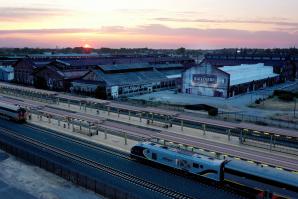UCLA researchers predict that California’s economy will get hit harder by the coronavirus than most U.S. states. However, the Greater Sacramento Economic Council is already leading the local recovery effort.
The coronavirus pandemic continues to wreak havoc on the world economy, with UCLA researchers predicting last month that California will get hit harder than most U.S. states, largely due to severe impacts to the tourism and transportation industries. However, the Greater Sacramento Economic Council, a group dedicated to developing “inclusive economic growth” across the six-county region, is already leading the local recovery effort.
Comstock’s spoke to GSEC President and CEO Barry Broome about the future of the regional economy.
Click here for more coronavirus coverage
What is GSEC doing to help local businesses affected by COVID-19?
Barry Broome is the president and CEO of the Greater Sacramento
Economic Council. (Photo courtesy of Barry Broome)

Our job is probably more recovery. On the small business side, we’ve helped the Asian Chamber of Commerce and the Sacramento (Metro) Chamber of Commerce with fundraising to help build portal capacity on the website so that people can go in and get support. We have been working with fintech companies in the region to help improve an outward-facing online model in between banks and small businesses. A lot of these businesses do not know how to fill out the paperwork. Banks are doing 12 months of work every five days right now. You have a third of the small business economy applying for the loans. It’s an incredible need for virtual communication, quick online digital communication, and a quick coaching and information exchange.
Related: Sacramento Metro Chamber Launches Rapid Response Tool for Businesses
What is happening with existing projects like Aggie Square and the California Mobility Center?
All of our projects are moving forward, some as robust as always, some will move a little slower. We had about $6 billion worth of capital investment in the pipeline to construct in the urban region. (Major League Soccer) is still a go (with the stadium at The Railyards expected to open in 2022), and Aggie Square is still expecting to break ground this year (near the UC Davis Medical Center in Sacramento). These projects were important before, and now they’re critical because what happens in the next three to six months is going to drive what happens to the recovery. The things we’ve been working on have been designed to give the community an economy for the future, not chase the old economy. Sac State anchors the mobility center along with Los Rios (Community College District). UC Davis anchors Aggie Square. Those institutions are going to be hit for a while, but they’re going to be resilient. Our institutions that are resilient are the backbone of our economy, and those resilient institutions are moving our economy into the future.
Related: At The Railyards, it’s Full Steam Ahead
How does the interactive SizeUp tool on the GSEC website work?
Most of us that work in this field have deep statistical backgrounds. This SizeUp tool on our website allows someone to come in and model their company a little bit. What should you be doing with advertising? What should you be doing with new products? What should you be doing about competition? What should your pricing be coming out of this? What are you going to do with your business when … the stay order is lifted? It’s teaching us how to work in a more granular way with digital applications.
How can the greater Sacramento economy make a quick recovery?
We’re going to have to act against our intuitions. Our intuitions are to be careful, be cautious, hunker down, wait for a better day, and that’s not the right strategy. We did that in 2008, and the better day didn’t come until 2014. We have contacted Sacramento officials and have asked them to continue to move the transportation tax forward in November as originally planned. (The development of) 5G is going to be a bread and butter infrastructure need as a community. In 2001, the greater Sacramento region led everybody in recovery in the west; 2008, we were the last. In seven years, we went from leading the recovery to being the last. If you look at what’s happened since 2000, other states and other communities have been working harder to get better at growing their economy, and our state has gotten less skilled at it. In the last 20 years, the state has chosen to disarm itself from the competition for jobs.
Related: Slow Progress for Fast Speeds
Related: A Survivor’s Tale
What can state leaders do to make California a more attractive place for businesses to invest?
We’ve done all the amazing, courageous things on the pandemic. I hope that there’s enough courage among California leaders to finally admit that some of this regulatory oversight has just been excessive, and it’s been harmful. (Assembly Bill) 5 is not a good law, and PAGA (the Private Attorney Generals Act) is a horrible law, and repealing those kinds of laws now is going to be an important part of the recovery. The only thing you can do is reposition your current behaviors into better behaviors, and to lift the burden off the backs of businesses. We have to get very serious about this economy, and patronage groups and special interest groups, they have to get frozen out of the decision making. We need to make these decisions around evidence, just like we did with the coronavirus.
Related: The Defenders of Small Business
–
Stay up to date on the effects of the coronavirus on people and business in the Capital Region: Subscribe to the Comstock’s newsletter today.
Recommended For You

Sacramento Metro Chamber Launches Rapid Response Tool for Businesses
Online hub provides resources for businesses affected by the coronavirus
In response to the crisis of the coronavirus pandemic and the rapidly evolving set of challenges it presents for businesses and workers, in addition to public health, the Sacramento Metro Chamber of Commerce has launched a Rapid Response tool on its website.

At The Railyards, it’s Full Steam Ahead
Backed by the expected arrival of a Major League Soccer team, development is stirring at the long-dormant Railyards in downtown Sacramento.

Slow Progress for Fast Speeds
Two years after partnering with Verizon, few Sacramento neighborhoods have 5G availability
Sacramento boasted of being one of the first four test cities for Verizon’s 5G network, with officials calling it a major step toward the future. But nearly a year after launch, none of the city’s eight council districts have full 5G coverage — and it isn’t clear when any of them will.

A Survivor’s Tale
TSI Semiconductors in Roseville is flourishing again, bucking a trend of diminished manufacturing in California and the U.S.
The last remaining microchip plant in Northern California has found ways to thrive in a challenging market.

The Defenders of Small Business
John Kabateck on the myriad challenges facing Main Street, USA
John Kabateck of the National Federation of Independent Business speaks to Comstock’s about tax issues affecting business in California and his organization’s position on Assembly Bill 5.



